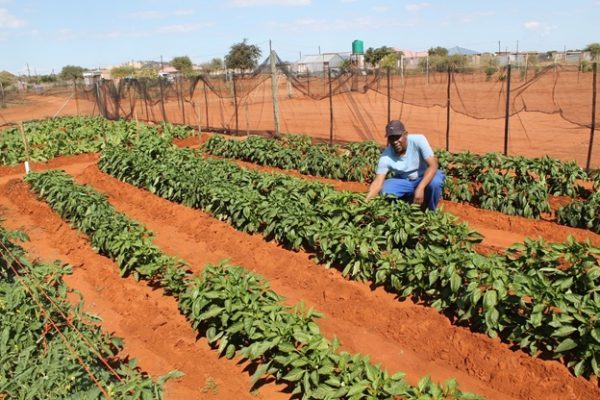Emerging farmers from the Limpopo town of Lephalale are participating in a development programme that is changing their lives for the better. This is after the National Treasury’s Jobs Fund has teamed up with the Lima Rural Development Foundation to support smallholder farmers in 16 sites across five provinces.
From Limpopo, Eastern Cape, KwaZulu-Natal, to Mpumalanga, and Free State, small-scale farmers are receiving assistance from the Lima Smallholder Farmer Support Programme, whose objective is to create 4, 700 jobs and to train 12, 800 farmers nationally.
The Jobs Fund has provided R60 million grant funding to the programme . Lephalale, one of the driest areas in South Africa, is a challenge due to the low levels of rainfall it receives. The town experienced an economic boom at the height of the construction of the Medupi Power Station, but the construction of the coal-fired plant is nearing completion, resulting in the scaling down of the workforce required for construction.
“The intervention is creating jobs in the area while simultaneously helping diversify the town’s economy away from dependence on coal mining and electricity generation”, says Najwah Allie-Edries, Deputy Director General for Employment Facilitation.
The integrated support services to farmers are delivered by Lima through agri-hubs, where beneficiaries can walk in to either seek loans; order and collect inputs; access farming equipment or apply to participate in off-take contracts that Lima has entered into with major food retailers. Lima also uses highly-skilled agricultural extension advisors who visit farmers to provide technical advice about crop, poultry, pig, and livestock farming.
Duncan Stewart, managing director of the Lima Rural Development Foundation, says: “These farmers have a history of being under-serviced and face stiff market competition from their commercial counterparts. They are isolated from input and produce markets as well as production information, contractors, and credit facilities,” explains Stewart.
The Lephalale agri-hub, which is currently being run by Lima employees, is in the process of being handed over to the project’s beneficiaries. A co-operative, run by five beneficiaries, has been set up to run the hub and to develop local farmers. This co-operative will establish a big feedlot that will expand livestock farming in the area and enable local farmers to fetch better prices for their meat. However, this will require funding to train beneficiaries to operate the feedlot.
One of the beneficiaries of the project is Samuel Baloyi, an employer of four workers who started vegetables farming on an 18-hectare farm in 2013. He has been a part of the Lima programme since October 2016 and has installed an irrigation system which enabled him to switch from dryland farming to irrigation farming.
“I got into farming because I wanted to produce food and diversify my income streams. I also rent out rooms to generate income and have tavern and taxi businesses. Lima has helped me get ahead in farming.
“Lima has provided me with young workers, who came to my farm for training. I did not pay for this labour. Lima has also assisted me to access farm implements,” says Baloyi.
Baloyi plants cabbages, spinach, and beetroot, which he supplies to retailers Pick n Pay and Boxer Stores. He also produces the drought-resistant millet that he sells to local cattle and sheep farmers to feed their livestock as Lephalale is a bushveld, semi-desert area that lacks suitable grazing land.
Baloyi has completed Lima’s Business Management training and partially completed annual crop production training.
There are other farmers that are benefitting from the Jobs Fund-Lima project including a group of eight dryland and livestock farmers from Lephalale’s village of Magadimela.
The farmers that form this group are Melita Chepane, Piet Sekokotla, Catherine Motsoko, Joseph Tsiri, Samuel Makotla, Piet Rakoma, Dorothy Tala, and Andries Malahlela. These farmers have mini-lots and are producing dry beans, watermelons, ground nuts, maize, and millet – which they use to feed their livestock.
“Lima has helped us with loans and supplied us with vaccinations for our livestock. They have also given us technical advice on livestock and dryland farming. The main purpose of planting here is to feed our livestock because it is difficult to graze here. We harvest and store the Babala [millet] to feed livestock in our feedlots,” explains Chepane, one of the farmers.
These farmers, who are farming on communal tribal land, have received Lima’s training in business management, annual crop production, and livestock production.
“More than 12 800 farmers have received free training during the last funding period. As a whole, these farmers produce a turnover of more than R120 million annually from their farming livelihoods. At Lima we aim to meaningfully integrate smallholders into the agri-business industry, by linking farmers to quality input suppliers and sales markets, as well as have access to credit, technical support and mechanisation” concludes Stewart.








